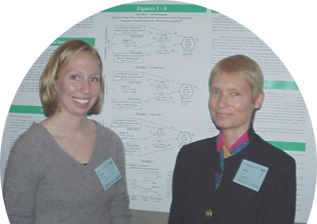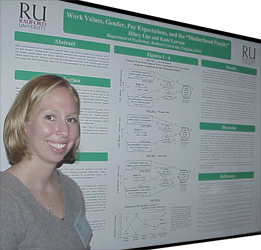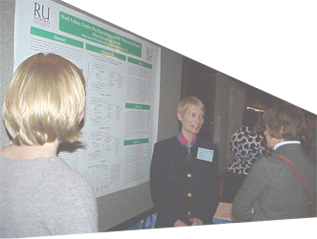A Poster Presentation by Ms. Katie Lawson & Dr. Hilary Lips
Southeastern Psychological Association - 2008 - Charlotte, NC


click on the poster above for a 4x larger view

 Poster
Abstract
Poster
AbstractMale undergraduate survey respondents expected higher peak salaries, valued power more and family less than females. Valuing power was positively associated with expected peak salary. For men, but not women, valuing family was directly and positively linked to peak pay expectations. For women, valuing family was only indirectly, and negatively, associated with peak salary through expected work time, suggesting that work-related values may lay some groundwork for the motherhood wage penalty.

Introduction
& Background
In 2005, U.S. women fulltime year-round workers earned 76.7 cents to
every dollar earned by men (Webster & Bishaw, 2006). The gender wage gap
has been explained by factors such as the “motherhood penalty”
(Anderson, Binder, & Krause, 2003; Budig & England, 2001; Correll,
Benard, & Paik, 2007), discrimination (Noonan, Corcoran, and Courant,
2005), career choices (Hesse & Carter, 2000), work values (Frieze,
Olson, Murrell, & Selvan, 2006), and pay expectations (Jackson, Gardner
& Sullivan, 1992; Kaman & Hartel, 1994).
Whereas some studies find
gender differences in work values (Rottinghaus & Zytowski, 2006;
Sinisalo, 2004), one large study by Frieze and colleagues (2006) found
no gender difference except that women rated “wanting to do an excellent
job” as more important than men. Despite research suggesting gender
differences in some work values, little research has investigated gender
differences in work values in relation to the gender pay gap. However,
Frieze and her colleagues (2006) demonstrated that work values
contribute to both actual salary and career engagement.
Salary
expectations are a predictor of actual salary (Hojat et al., 2000).
Thus, it is of interest to understand what variables underlie gender
differences in expectations. The present study extends the work of
Frieze and colleagues (2006) by focusing on work values as a possible
underlying variable in expected, as opposed to actual, salary.